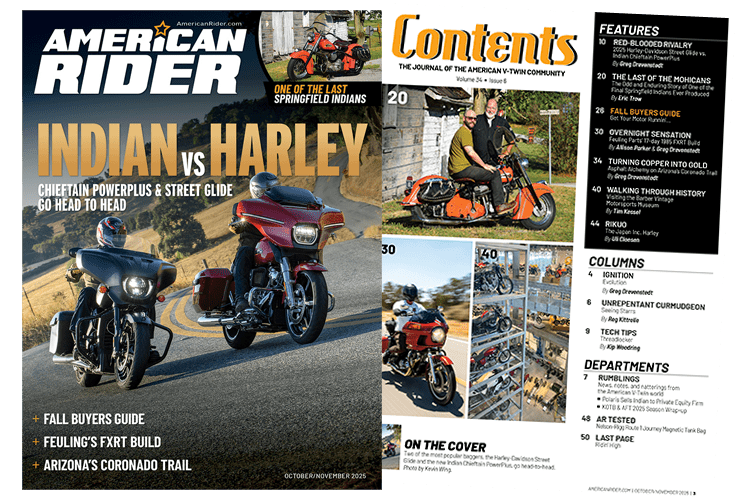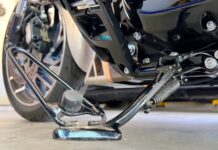A year ago this month I was moseying down the freeway in Sacramento when a pack of three sportbike riders entered the slow-moving rush-hour traffic from an on-ramp. I noticed them because they were zipping between the cars, since lane splitting is legal in California, though they were pushing the official definition of that privilege. It was cold and just getting dark as the cagers were jockeying from lane to lane trying to be the first to get home and it had started to sprinkle, all the components that make for a tense ride.
I had just told myself that I ought to head for an exit ramp, since the congested roadway was kicking my spidey-tingle into hyper-drive, when suddenly there was an odd “whoosh-click” noise closely followed by a few impulse gear/clutch/pitch maneuvers, a skidding sound and a ticker-tape type flashing through my head that read, “This is gonna hurt tomorrow.” And then there was a final “wham.” All that was topped off by a sudden drop to the newly-laid blacktop and an attempt to kick away from my still-spinning motorcycle before I found myself face down on the freeway, with headlights illuminating the scene as I lifted my head. I knew instinctively that I had to get out of the road, but I could not immediately lift myself. It took a couple of tries before I could breathe, let alone stand up.
My beloved 16-year-old Heritage lay bleeding from its wounds in the next lane, as I tried to understand what had just happened. Drivers got out of their cars to help pick up my motorcycle, as well as the three-lane spread of personal items that had spewed from the shredded saddlebags. I never met the owner of the new car that now carried the outline of my body in its trunk, or the witnesses that described the rider who had so badly misjudged the space between my lane and his. He kept going, never stopping to see what damage he had done but his friend did, though he denied knowing the offending biker as he sped off before the police could arrive.
I didn’t have health insurance, but I quickly came to realize that what I did have was damned good “full coverage” motorcycle insurance. After years of listening to other riders brag about how cheap their policies were, and harassing me for extensively covering an aging bike, I was suddenly quite grateful for the higher premiums I had struggled to make each month. A lot of my friends just have what’s required by law, the bare basics, with their logic being that it’s just a bike; no big deal. Yes, I’ve actually had riders tell me, “It’s just a motorcycle. How much damage could there be?”
Well, for me the motivation behind the policy I had purchased meant my entire lifestyle. Living on my bike means that all I have is on those two wheels, so with that in mind, the motorcycle was the priority when sitting down with my agent. I knew I’d never be able to afford a new ride and the thought of being without a bike at all terrified me, so replacing it in case of a catastrophe was what I considered when choosing which liability limits to get. Thankfully, uninsured/underinsured was part of the package I purchased. Since the accident was a hit-and-run, with no way to check the policy of the at-blame party, this is the part of my coverage that came into play.
In the following months I learned a lot during negotiations with the various stages of insurance personnel, though I did eventually consult a friend who is a motorcycle injury attorney and he gave me wonderful advice. Initially they wanted to rush right through and pay me off since it appeared that my injuries were minor and would just involve time to heal. They were quick to make an offer on the corpse of my bike, having sent an adjuster out within days to appraise it and make the determination that my riding partner of all these years was totaled. Emotionally, I just wanted it over with so I’d no longer have to look at the ever-growing puddle of oil that continued to seep from the gaping hole in the primary, and that was where I made my first mistake. I settled on the collision part of the claim too early. Had I waited, my policy would have allowed for some compensation for a rental while my claim was settled. Instead I had to foot the bill for my transportation myself.
Here is a general list of what I found to be helpful when dealing with my particular insurance claim:
• Keep a journal. Record everything—all the details of what happened, how you felt, your physical injuries and any interaction you have with insurance personnel or anyone connected with the accident. This is very important, since our memories fade and you may eventually downplay the impact the accident has on your life. This documentation is also helpful if you find yourself in court in order to reach a settlement. Included in this should be any photos you have of your wounds, which should be taken immediately, and of the scene, if they are available.
• Do not be too hasty to settle. The longer you wait, the more you find out about your injuries and the long-term problems you might have. I discovered that insurance companies are anxious to settle quickly for that very reason. The longer they have a claim sitting on their desk, the more expensive it becomes for them so they will push for a quick payout (although I generally felt my insurance company was on my side). Take your time, clear your head, learn about your policy and ask questions.
• Do not try to be a tough guy and ignore your injuries, no matter how minor. Consider your health first and foremost.
• Consult an attorney. I was lucky; my insurance company was very reputable, stepped up and did the right thing so we did not have to go to court, but there are still some slippery slopes to face in the negotiations process. I got through the property loss phase with minor mistakes, but when it came to my health and the personal injury provisions, it was crucial to have the advice of a professional.
• Last, but not least, review your policy before you have a disaster. As a matter of fact, go check it now. Look at your limits, clauses and coverages. Do you have uninsured/underinsured binders? Are your limits adequate? Do you have provisions for time off work if you sustain an injury? Imagine being hit by some yahoo with no insurance. If you don’t have that protection for yourself, you could be screwed, my friend. You could end up paying out of your own pocket to fix your bike or pay your bills. Personally, I’d rather pay on the front end each month when I make my premium payments. Maybe it’s worth a phone call to your agent to review your policy.
I replaced my broken bike with a Street Glide and, when taking out the new insurance, I doubled the limits. In terms of accidents, I probably had one of the better ones, since I was in full gear and actually bounced pretty well. I walked away, but still had some injuries that required surgery and the medical costs were beyond my ability to pay, which is where adequate insurance coverage comes in. I cannot advocate enough how important this is, folks. It’s what has allowed me to continue to live my life of scooting on down the road and dropping you all an occasional note.




















Hi Felicia, Sorry to hear about your accident. Great Advice!!
Dear Felicia hope you are ok.So much for brotherhood amongst motorcyclists.